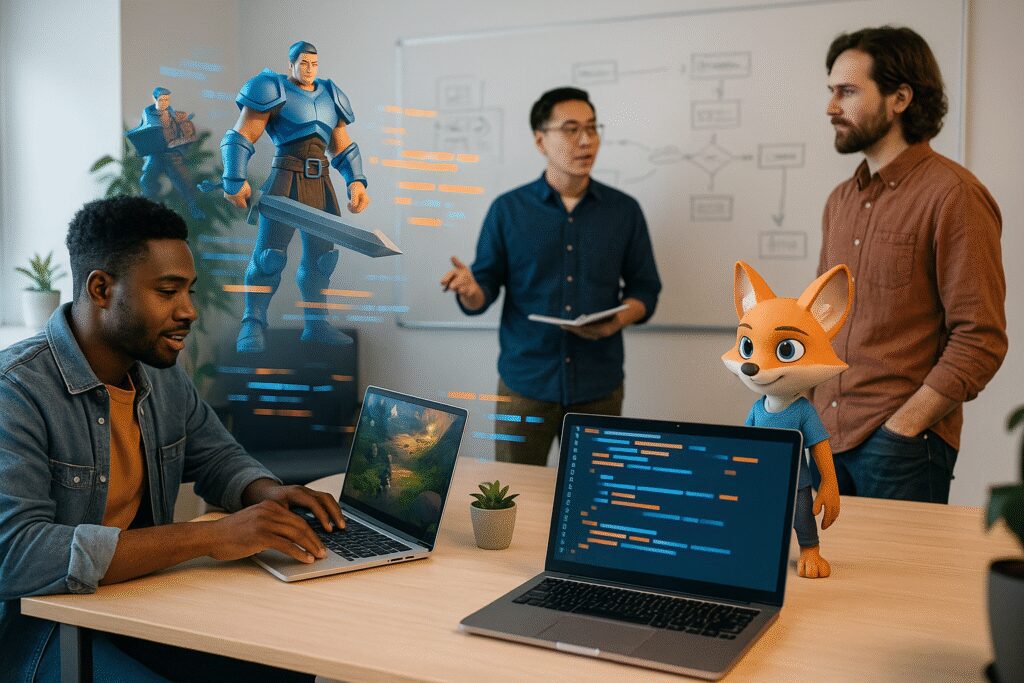Video games aren’t just entertainment anymore — they’re a global business worth billions. But creating them takes time, talent, and a lot of money. That’s why more and more studios, from scrappy startups to well-known publishers, are turning to game development outsource solutions.

Outsourcing can cut costs, speed up development, and connect you with global talent pools. But is it always the right move? And how does it compare to keeping everything in-house? In this guide, we’ll unpack what outsourcing really means, the benefits, the risks, and how it stacks up against building a game with your own team.
What Does Game Development Outsource Really Mean?
When people talk about outsourcing game development, they’re not always referring to handing off the entire project. Outsourcing can cover:
- Game design & prototyping – early creative work and mechanics.
- Programming – specialized coding like multiplayer systems, AI, or porting to new platforms.
- Art & animation – 2D sprites, 3D modeling, character design, visual effects.
- Quality assurance (QA) & testing – finding bugs and ensuring stability.
- Live operations & updates – maintaining games after launch.
Some companies outsource just one area (say, art assets), while others outsource whole projects from start to finish.
Why Companies Outsource Game Development
So, why do studios — big and small — outsource?
Recommended : Crypto Com Play Store: How to Safely Download the Official App
- Cost Savings
Hiring in-house developers in North America or Western Europe is expensive. Outsourcing lets companies tap into regions with lower living costs while maintaining high skill levels. - Access to Global Talent
Sometimes, the expertise you need isn’t available locally. Outsourcing gives you access to specialists worldwide, from VR programmers in Ukraine to pixel artists in Brazil. - Faster Time-to-Market
Building an in-house team takes months. With outsourcing, you can scale quickly, assemble teams on demand, and meet deadlines faster. - Flexibility
Studios can outsource only what they need — whether that’s one phase of development or an entire game.
In-House vs. Game Development Outsource: Which Is Better?
Both approaches have strengths and weaknesses. Here’s how they stack up:
| Factor | In-House Development | Game Development Outsource |
|---|---|---|
| Cost | High (salaries, benefits, office space) | Flexible (depends on location & model) |
| Talent Access | Limited to local hires | Global talent pool |
| Control | Direct oversight | Requires trust & strong communication |
| Scalability | Slow & expensive | Fast — teams can expand/shrink as needed |
| Speed to Market | Depends on hiring capacity | Usually faster |
| Long-Term Knowledge | Expertise stays in-house | Risk of knowledge gap when vendor ends work |
Verdict? If you need long-term control and ongoing projects, in-house might be best. But if you want speed, flexibility, or lower costs, outsourcing is hard to beat.
Cost Breakdown: Game Development Outsource vs. In-House
In-house costs
- Salaries for developers, artists, and QA.
- Benefits (health insurance, retirement plans, etc.).
- Office costs and equipment.
- Recruiting and training expenses.
Outsourcing costs
- Hourly or project-based vendor rates.
- Management overhead (time spent coordinating).
- Possible extra costs for revisions or scope changes.
Pricing Models for Outsourcing
- Fixed-price contracts – Best for small, well-defined tasks.
- Hourly billing – Good for flexible or evolving projects.
- Hybrid models – A mix, often used in long-term partnerships.
Tip: Always ask for a transparent cost structure. Hidden fees and unclear contracts are red flags.
Best Countries for Game Development Outsourcing
Outsourcing is a global industry, but some regions stand out:
- Eastern Europe (Poland, Ukraine, Romania)
- Strengths: Highly skilled programmers, strong work ethic, cultural overlap with Western markets.
- Weaknesses: Rates are higher than Asia, but still lower than Western Europe.
- Asia (India, Vietnam, Philippines)
- Strengths: Competitive pricing, large talent pools.
- Weaknesses: Time zone and communication challenges in some cases.
- Latin America (Brazil, Argentina, Mexico)
- Strengths: Growing tech hubs, good time zone alignment with North America.
- Weaknesses: Smaller talent pools compared to Asia or Europe.
How to Choose the Right Game Development Outsource Partner
Not all outsourcing partners are equal. Here’s what to look for:
- Experience & Portfolio
Check past projects — do they align with the type of game you’re building? - Technical Expertise
Does the team specialize in your required engine (Unity, Unreal, etc.)? - Communication & Culture
Time zones, language, and workflow matter. Miscommunication can delay projects. - Scalability
Can they expand the team if the project grows? - Red Flags
- Unrealistically low prices.
- Lack of transparency in contracts.
- No clear project management process.
Future of Game Development Outsourcing
The outsourcing landscape is evolving fast:
- AI-Assisted Development – Tools like procedural generation reduce costs.
- Remote Collaboration Norms – Cloud tools and video conferencing make global teams seamless.
- Hybrid Models – Many studios now combine a small in-house team with outsourced specialists.
Outsourcing isn’t just a cost-cutting tactic anymore — it’s becoming a strategic way to stay competitive.
Conclusion
Game development is complex, resource-heavy, and competitive. Whether you’re a startup with a single game idea or a publisher managing multiple titles, game development outsource strategies can give you flexibility, access to global talent, and faster results.
Must read: Win Money Real Cash App Download – Best Legit Apps to Try in 2025
Still, outsourcing isn’t a one-size-fits-all solution. If long-term control and knowledge retention matter most, in-house teams may be worth the investment. But for many, outsourcing — especially when done strategically — is the smarter, leaner path forward.
WFG recommends approaching outsourcing with clear goals, careful partner selection, and an eye on the future trends shaping the industry.
FAQs
How much does it cost to outsource game development?
Costs vary widely depending on the region and complexity of the project. Simple mobile games might cost $20,000–$50,000 outsourced, while large-scale AAA projects can run into millions.
Is outsourcing game development worth it?
Yes, if your priority is saving money, accessing talent you can’t find locally, or speeding up production. However, it’s best paired with strong project management and clear communication.
What is the difference between outsourcing and in-house development?
In-house means hiring full-time employees under your company, while outsourcing means contracting an external studio or freelancers to complete parts (or all) of the project.
Which country is best for game development outsourcing?
It depends on your needs: Eastern Europe offers high-quality programming, Asia provides affordability and scale, and Latin America balances cost with time zone convenience.




Pingback: remote game tester jobs
Pingback: mobile game app development company
Pingback: game development freelance rates
Pingback: remote jobs for gamers
Pingback: play crypto